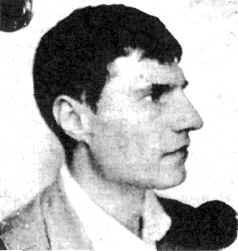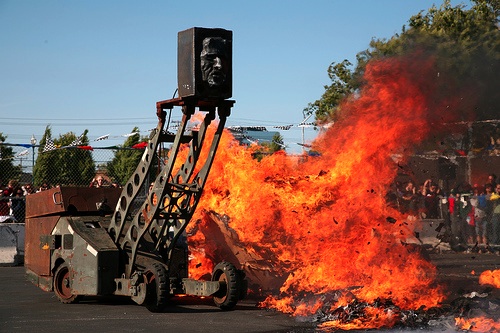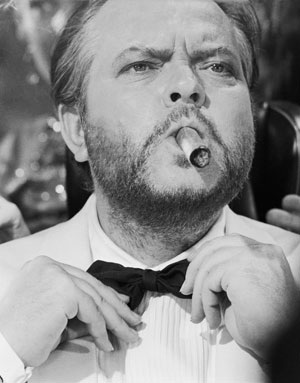Dr. Yes and the Mystery of the Mission, Part Eight
19 Feb 2010
My heart leaps up when I behold
A rainbow in the sky:
So was it when my life began;
So is it now I am a man;
So be it when I shall grow old,
Or let me die!
The Child is father of the Man;
I could wish my days to be
Bound each to each by natural piety.
--Wordsworth, 1802.
Dr. Yes awoke cold and shivering in Golden Gate Park to see himself surrounded by figures from the past year of his life. He saw the furtive sniper cross-legged in front of him holding up a single bullet, staring at it as if it were a rare specimen. He saw the woman who had fallen from the Shotwell Street apartment, her leg broken and pointing like an arrow. She stared at him, mute, mouth open, eyes half-closed. Frozen.
Then through the fog other figures appeared. Former girlfriends, janitors from his school days. People he had seen on trams, buses, trains over the years on and off. Family members. This was the flotsam of memory - all the figures of half-remembered life-in-passing. The transients of time. His shopping cart was still there, stacked up with dead computers.
The scene in his mind was like the end of a ghostly stage play, the moment where all the cast of the production lined up ready for the curtain to rise, when audience and cast have yet to face each other, the spell of the play now behind them, each about to acknowledge the other into the newly born shared spectacle of parallel participation. He recognized many of them as the people he socialized with in the early 1990s when the city was wide open to him.
In 1992 Yes was a young artist, a teacher, a film maker. But he had enjoyed no real context here. No real knowledge of the city and its people. He'd stumbled most of the time into awkward alliances and friendship and the occasional lover. Most of the time he was humored as a kind of intercultural curiosity. He was, truth be told dismissed as if he would eventually leave the city, the country, and it was this implicit basic assumption underpinned the way most people had related to him. He was like a collectible, a "found object."
"He's visiting" they would say to each other of him, and this fact would hit him hard, like an inalienable, but undeniable fact. No matter how much the city spoke to him as no other had before, his stigma as an outsider always framed the Mission's best potential. All the parties. All the creative events. All the comic book making. The over-the-top Bacchanalian Halloween parties in the Castro. The basement screenings, drunken, stoned and strangers groping in time to the shutter-through-the-gate. All would be defined like the frame around a painting by the 'must leave by' (fill-in-the-date-here) stamp in his passport. And thus Yes thought:

"Every man here is thus his own Alex Trochhi"--forced to leave, by virtue of his own impact on the scene.
So the city took as it gave. Everything he ever wanted. Here, but for a limited time.
"For a limited time only--everything you ever wanted!"
All the film production. All the long mornings with sun pouring in through a bay window as it hit the hair of an all-night lover. All that technological innovation in a thousand bedrooms and backrooms of an early, edgy videogame and internet subculture. All of it was to go away. The INS and the pull of demands back home, like a huge intercontinental rubber band would have it no other way, on pain of prosecution and possible permanent exile. Until the next grant. The next set of savings. Until the next opportunity. This was the 1990s. Globalized. Tentative. Utopian. Limited. Back then he wrote for a British newspaper on innovation in the digital underground. His copy sent via phone modems and laptops. Few had these things then and even using one in public was considered a bit pretentious. "New Scene in San Francisco's Mission" read the headline. "Old and New Technology Meet in Curious Bohemia".
That date stamp in the passport. The temporary nature of every visit. It was like a ship that was forever leaving the harbor, without you on it. It was like being given a really great present for your birthday and then realizing that the item would have to go back to the store the next day. It wouldn't have been so bad if those he'd come to love here were in any way genuinely sympathetic or demonstrated any kind of consideration for this fact. Rather, they looked upon him with the sad mock-concern reserved for the afflicted. They looked often in a patronizing and condescending way, as if the limits to a visiting visa were the social equivalent of a malignant and inoperable cancer, one in which full social participation would always be characterized and undermined by the encroachment of an a regrettable, but crucial-to-acknowledge finality.
It felt like civil death.
A persistent, nagging dripping tap of certainty back then had tapped away at every single event for Yes then. Always one day to go back, go away to some other place where he was supposed to have emerged from and what did it matter where? San Francisco was the hub, so anywhere else could never matter as much as here. And he'd believed that. Believed it to the point where he made it his life's purpose to return. The exact details of that event now as cloudy as the fog which engulfed the park, the sky and his sanity. Those that didn't like Yes could exhibit the glib satisfaction that the limits of legal entry to their world offered them a sly smugness that only the truly parochial can ever feel. Those that did like him, even loved him had to resign themselves to a world in which he would be around for a while, then leave, like particularly hot summer, or a particularly rainy winter. Real, felt, then replaced by something else.

They now appeared before him as apparitions. Back then he remembered, with an intensity that bordered on obsession - the Mission had been alive with creative activity, before globalization had really taken hold. Before the real arrival of the internet. Then for cash-strapped visiting artists, or 'tourists' as they were so often dismissed by the locals, it was all skateboards, comics, underground film, cassette tapes and DIY 'zine production. Every other house had some kind of offbeat activity going on in it. And all this classic American Bohemia had happened mainly in the Mission district. It was cheap. It was available. It was cool.
That Dubloon from the Mission Delores he'd been shown before his crisis had been a sign of what was coming. Something big. Like the Rodney King thing back in 1992. Some major event in Yes's mind was coming thick and fast and for similar reasons as that event. When the lie becomes too big to hide beneath the hype, the population snaps. Its been part of the US culture from day one.
The sniper, the dubloon, its image of the comet. The winged serpent - Quetzalcoatl - it was all some big event about to unfold which he and he alone could see as the patterns formed, emerging from the detritus of everyday life? Even the fire in Shotwell--probably a fire lit by real estate developers.
"This whole area is going luxury" he had heard one of them say to another as they passed him on Mission Street on day. All Armani suits, crisp braces, designer shoes and recent-model Porches. They sounded like they meant it and as if Mission street was already their territory.
Last summer he'd seen one real estate agent standing, legs astride, designer sunglasses reflecting contrails in the sky, a homeless man lying on the street near him, with a piss trail to the gutter. There this amazingly offensive yuppie stood, all pride, all confidence, gold cufflink reflecting the summer sun, on the phone to the Mission police department.
"He's stinking up the whole street, officer. Can you send someone down to address the situation?"
Yes then had another flashback. He saw himself in 1992 in San Francisco on his first visit as an adult. A young man of 32, ready to embrace the city for what it was. He had been overwhelmed by the experience, and at its center were women friends who had introduced him to what the city had to offer. These women were beautiful. They were creative. They were artists. Filmmakers. Singers. Animators. They all were his sisters. But just as they figured he would do, they eventually all just vanished themselves. Left.
Went to some other place. The houses and apartments of course still stand, silent witnesses to once furtive moments of passion and intense discussion. Occupied now by well-adjusted professionals, looking for a ten, maybe twelve percent return on a mutual fund. A good investment. A solid nest egg.
No sign now of the graffiti and the acid trips, the wild and drunken festivals of bohemia of that time. All its traces removed, like an airbrushed photograph at the hands of a revisionist propaganda department. Gone like Trotsky in a Stalin-Era photo. Rust never sleeps. Replaced by what? Twittering, Facebooking, Google-plexers with "American Apparel" clothes and a Macbook pro and an apartment that's "Soooooo cool."
Gone is the Chameleon Bar. Gone is the Café Beano. And where today is the Red Man? His diminutive red-faced Dali-like visage gracing the corner of 16th & Valencia. What happened to the Survival Research Labs? What of the $12 a-night guest houses filled with German hippy renegades drinking Colt-45 every night and playing cards and smoking, all the while on the lam from national service back in the old country?

What of scammers who bought and sold stolen electronics who lived in such places? Or the canny 20-year old British kids selling fake Ren & Stimpy T-shirts and selling them like hotcakes? What of young Austrian girls with names like Babsy and Gretchen who bought three hundred dollar Buicks to drive to Uruguy and back? What of SFNET?
Its all gone. The 1990s are gone. 9/11 put the last nail in the coffin of all it stood for. Capitalism as automatically resulting in democracy. It was a thin argument then, and purely non-existent now.
"What was your 1992?" one of the figures asked of him. "And what would you have your memory of that time do for you now, Dr. Yes?"
Dr. Yes reached for the apparition, who to him appeared against the night fog, the moon passing behind its folds of cloud. It spoke again.
"Answer me. What WAS your 1992?"
Yes spoke softly staring through the cold air at this hybrid vision of all his early 1990s girlfriends.
"It was my awakening. It was my initiation into the ways of adhocracy. It was my birth as an artist and as a truly creative thinker and subject. It was my true beginning?."
"And why can't you let it go?"
"Because it made me. Because that time was a time when I came truly into myself as a person and as an artist. When I was making decisions for myself, on my own behalf. I admit. I never got over it."
Yes remembered back to the events of the Rodney King riots - the smell of smoke wafting around from Market street, where shops were burning. Those Symbols of outsider-hood, the liquor stores frequented by the homeless and the destitute were the first to go. Weren't we all burning something inside ourselves that night? Was not the rulebook thrown out as Mexican men spat on Gringo men, and at any given time, a chance encounter with a group of rioters could spell ecstasy or death? Was not the face of the girl who ran into ATA from the mayhem outside not flush with sexual excitement as she looked at you, Yes? He had filled dozens of little blank books with drawings and clippings and notes to himself at the time somehow trying to make sense of it all. His father had lived and died here, but he himself had no formal ties to the city until that year. He was a European, not a U.S. National, and so had to apply and reapply to come back to San Francisco. His father walking around then, each unbeknownst to the other, until it was too late and the father had died.
Was life ever as intense and real as this, Yes? Did you ever live your life in as real a way as this? He heard himself ask as the moon appeared and then disappeared behind the clouds.
Yes rubbed his eyes. He saw her then kneeling next to him. It was Marie.
"Why you are cold and tired, Dr. Yes?"
"Come with me. I'll get you some eggs and coffee?"
He stood up slowly and saw that he had urinated on himself. His rags, the blankets, the shopping cart. Other figures moved beneath their covers all around him in the park.
She led him to her car, and they drove to the house at Masonic.
He had a bath, ate his eggs in silence. She held his hand.
He could not speak. He could not find the words. Days went by and like Jimmy Stewart in "Vertigo" after his nervous breakdown; he just sat in a chair dull-eyed and listless. Not even the geometric shapes appeared these days.
Months went by and with them the passing of the sun across the heavens. Behind Coit Tower and the bridges. The figures from his visions came to him occasionally and their demands were always the same.
"Who are you to revere this one time in your life?"
"Who are you to consider your oh-so once-upon-a-time experiences so important?"
"Don't you know other people have epiphanies they can never recapture?"
"You with your arrogant disregard for where you are and what you are doing, forever pining for your 1992. Don't you realize you look like a fool?" "The women you loved then have all married and had kids years ago, Yes!" "They've all gone!"
"You cheap tourist."
"You are still a tourist."
"Your little so called Mission "paradise" is now a good investment opportunity and where once your hipsters and your bike messengers, and your underground filmmakers once held court with the samplers, the culture jammers and all the rest of them? Now there is just...a sixty-thousand-dollars-a-year-or-more playground?"
"Google killed it!"
"Yahoo killed it!"
A figure turned to Yes.
"You killed it?"
"You with your utopian technologism - you with your deterministic faith in the future. You 1990s Fukuyama "End-of-History" utopianism! - YOU KILLED IT!!!"
Yes spoke back.
"No!"
"I had faith! I wrote about the scene! I made the scene! I still make the scene! There are enough of us left! Even ATA is still here! That HAS to prove something"
Just then she came back and invited him to join her at a large trunk at the end of the room beneath a stain-glass window. The smell of Earl Grey tea filled the room. It comforted him.

"Look in here" she said. She opened the trunk.
Inside was a carefully folded Inverness cape, a beautiful shiny black fedora and a long black shiny cane with what looked like a crystal ball on top.
"These were your fathers. This is the outfit of a magician. Unscrew the ball on the top of the cane."
Yes did so. Inside a pen was set flush within a red velvet inset in the cane. He pulled out the pen. Some paper wrapped around the pen opened in his hand like a leaf.
"Go ahead write something on the paper" she said.
Yes did so. He wrote "Show me this room in ten years."
In the ball, the view went cloudy. Then as the clouds cleared he could see the room he was in now, but teenagers were playing, throwing an object which glowed and flew and hovered. They laughed.
"These are your children, Dr. Yes. You will have them next year. This cane and this pen and this outfit are your new clothes. For you must truly become the Dr. Yes. you have wanted to be since 1992. Your 1992 was no accident, Dr. Yes."
"It wasn't?" he heard himself say.
"Your experience then was to prepare you for this you most important challenge. All the changes which have befallen the city are now the responsibility of its citizens to remedy. Those who remember the better times must join forces with others with something to gain from the city's reclamation. Dark forces gather around us, and the winged serpent is amongst us."
She helped him with the cape, and put the fedora on his head. He reconnected the ball after replacing the paper and pen.
He looked at himself in the mirror. He looked almost exactly like Orson Welles, minus the cigar.
She touched his shoulder. And whispered into his ear.
"You must now become Doctor Yes."
Dr. Yes will return in a forthcoming issue of OTHERZINE!